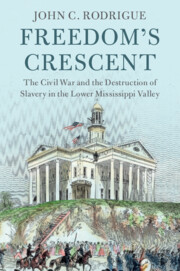Book contents
- Freedom’s Crescent
- Cambridge Studies on the American South
- Freedom’s Crescent
- Copyright page
- Dedication
- Epigraph
- Contents
- Figures
- Acknowledgments
- Abbreviations
- Additional material
- Introduction
- Prologue Life – and Labor – on the Mississippi
- Part I From War for Union to Military Emancipation, 1860–1862
- Part II From Military Emancipation to State Abolition, 1863
- Part III Abolition: State and Federal, 1864
- 10 “Slavery Is Incompatible with a Republican Form of Government”
- 11 Of Foul Combinations and the Common Object
- 12 “The Jewel of Liberty”
- 13 “The Virus of Slavery Is As Virulent As It Ever Was”
- 14 “No Longer Slaves but Freedmen”
- 15 “So Long As a Spark of Vitality Remains in the Institution of Slavery”
- 16 “Freedom, Full, Broad and Unconditional”
- 17 “To Resolve Never Again to Be Reduced to Slavery”
- Part IV The Destruction of Slavery, 1865
- Epilogue Memphis and New Orleans: May 1–3 and July 30, 1866
- Bibliography
- Index
16 - “Freedom, Full, Broad and Unconditional”
from Part III - Abolition: State and Federal, 1864
Published online by Cambridge University Press: 19 January 2023
- Freedom’s Crescent
- Cambridge Studies on the American South
- Freedom’s Crescent
- Copyright page
- Dedication
- Epigraph
- Contents
- Figures
- Acknowledgments
- Abbreviations
- Additional material
- Introduction
- Prologue Life – and Labor – on the Mississippi
- Part I From War for Union to Military Emancipation, 1860–1862
- Part II From Military Emancipation to State Abolition, 1863
- Part III Abolition: State and Federal, 1864
- 10 “Slavery Is Incompatible with a Republican Form of Government”
- 11 Of Foul Combinations and the Common Object
- 12 “The Jewel of Liberty”
- 13 “The Virus of Slavery Is As Virulent As It Ever Was”
- 14 “No Longer Slaves but Freedmen”
- 15 “So Long As a Spark of Vitality Remains in the Institution of Slavery”
- 16 “Freedom, Full, Broad and Unconditional”
- 17 “To Resolve Never Again to Be Reduced to Slavery”
- Part IV The Destruction of Slavery, 1865
- Epilogue Memphis and New Orleans: May 1–3 and July 30, 1866
- Bibliography
- Index
Summary
The Union capture of Atlanta in early September 1864 reframes the presidential election and the war. Louisiana’s free-state constitution wins voter approval and becomes operative, formally abolishing slavery in Louisiana, although military–civilian conflict continues to hamper the Unionist government. Free-state radicals and black leaders call for political and legal equality, but the Louisiana government takes no action in defining black freedom. The Arkansas Unionist government faces difficulties in asserting its authority, and it receives limited assistance from Federal military officials. In Tennessee, free-state and conservative Unionists offer competing plans for the state to conduct a presidential election, and black Tennesseans in Nashville hold their own election, but Tennessee’s electoral votes ultimately not counted. Andrew Johnson delivers “Moses of the Colored Man” speech during the campaign, affirming commitment to abolition. Republican support for the Thirteenth Amendment muted during the campaign, but Lincoln wins reelection.
Keywords
- Type
- Chapter
- Information
- Freedom's CrescentThe Civil War and the Destruction of Slavery in the Lower Mississippi Valley, pp. 318 - 336Publisher: Cambridge University PressPrint publication year: 2023

